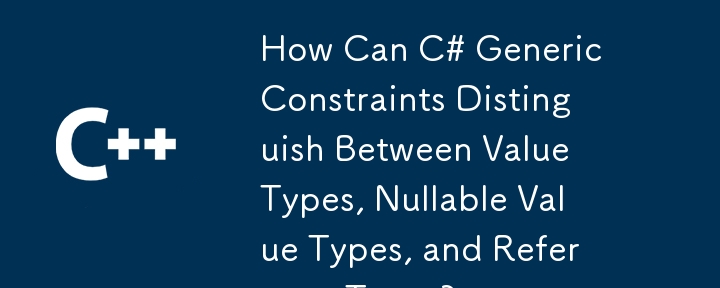
通用约束:区分值和引用
在 C# 中,通用约束可用于强制类型参数的特定要求。这在区分值类型、可为空值类型和引用类型时特别有用。
值和可为空值类型的约束
考虑以下代码,它区分普通值类型和可为空值之间types:
static void Foo<T>(T a) where T : struct { } // Plain value type (e.g. int)
static void Foo<T>(T? a) where T : struct { } // Nullable value type (e.g. int?)引用类型的约束
但是,尝试使用 where T : class 定义引用类型的约束会导致编译器错误。这是因为在重载解析期间会强制执行约束,并且参数优先于约束。
要解决此问题,可以将约束放置在参数内,尽管方式不太优雅:
class RequireStruct<T> where T : struct { }
class RequireClass<T> where T : class { }
static void Foo<T>(T a, RequireStruct<T> ignore = null) where T : struct { } // Plain value type
static void Foo<T>(T? a) where T : struct { } // Nullable value type
static void Foo<T>(T a, RequireClass<T> ignore = null) where T : class { } // Reference type通过将约束放置在可选参数忽略中,编译器可以区分不同的情况,而不会与参数类型发生冲突。这允许将引用类型按预期映射到正确的函数重载。
以上是C# 泛型约束如何区分值类型、可空值类型和引用类型?的详细内容。更多信息请关注PHP中文网其他相关文章!




